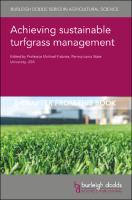Considerations with soil testing in turfgrass
| dc.contributor.author | Thompson, Cole | |
| dc.contributor.author | Guertal, Elizabeth | |
| dc.contributor.author | McGroary, Pauric | |
| dc.contributor.author | Soldat, Douglas J. | |
| dc.contributor.author | Hopkins, Bryan G. | |
| dc.date.accessioned | 2023-02-27T12:22:08Z | |
| dc.date.available | 2023-02-27T12:22:08Z | |
| dc.date.issued | 2023 | |
| dc.identifier | ONIX_20230227_9781801465090_53 | |
| dc.identifier.uri | https://library.oapen.org/handle/20.500.12657/61546 | |
| dc.description.abstract | Soil testing can be a valuable method to help turfgrass managers make fertilizer decisions and choosing the most appropriate soil test extractant is key. This depends on soil properties and the availability of correlation data for turfgrass species in the desired region. This chapter describes common extracts and demonstrates their efficacy for phosphorous and potassium extraction with three soil samples from the North American Proficiency Testing program (http://www.naptprogram.org/) administered by the Soil Science Society of America. Fertilizer recommendations were made based on regional sufficiency levels from university soil-testing laboratories and the Minimum Levels for Sustainable Nutrition (MLSN) guidelines from the Asian Turfgrass Center and PACE Turf. Sufficiency Levels for Available Nutrients (SLAN) or MLSN guidelines are most appropriate for deciding how to fertilize turf. However, recommendations based on an inappropriate extractant, calibration, saturated paste extraction, or ideal ratios or of major exchangeable cations (i.e., Basic Cation Saturation Ratio) are inappropriate. | |
| dc.language | English | |
| dc.relation.ispartofseries | Burleigh Dodds Series in Agricultural Science | |
| dc.subject.classification | thema EDItEUR::T Technology, Engineering, Agriculture, Industrial processes::TV Agriculture and farming::TVS Commercial horticulture | en_US |
| dc.subject.classification | thema EDItEUR::T Technology, Engineering, Agriculture, Industrial processes::TV Agriculture and farming::TVK Agronomy and crop production | en_US |
| dc.subject.classification | thema EDItEUR::T Technology, Engineering, Agriculture, Industrial processes::TV Agriculture and farming::TVF Sustainable agriculture | en_US |
| dc.subject.classification | thema EDItEUR::T Technology, Engineering, Agriculture, Industrial processes::TV Agriculture and farming::TVB Agricultural science | en_US |
| dc.subject.classification | thema EDItEUR::R Earth Sciences, Geography, Environment, Planning::RB Earth sciences::RBG Geology, geomorphology and the lithosphere::RBGB Sedimentology and pedology | en_US |
| dc.subject.other | soil testing | |
| dc.subject.other | turfgrass | |
| dc.subject.other | fertilizer | |
| dc.subject.other | soil test extraction | |
| dc.subject.other | soil test calibration | |
| dc.title | Considerations with soil testing in turfgrass | |
| dc.type | chapter | |
| oapen.identifier.doi | 10.19103/AS.2022.0110.22 | |
| oapen.relation.isPublishedBy | 9f8f6c63-e2ae-40b8-8aac-316abb377d6a | |
| oapen.relation.isFundedBy | 579a7ec2-660b-4189-bd11-91a04792d241 | |
| oapen.relation.isbn | 9781801465090 | |
| oapen.imprint | Burleigh Dodds Science Publishing | |
| oapen.pages | 22 | |
| oapen.place.publication | Cambridge | |
| oapen.grant.number | [...] |

